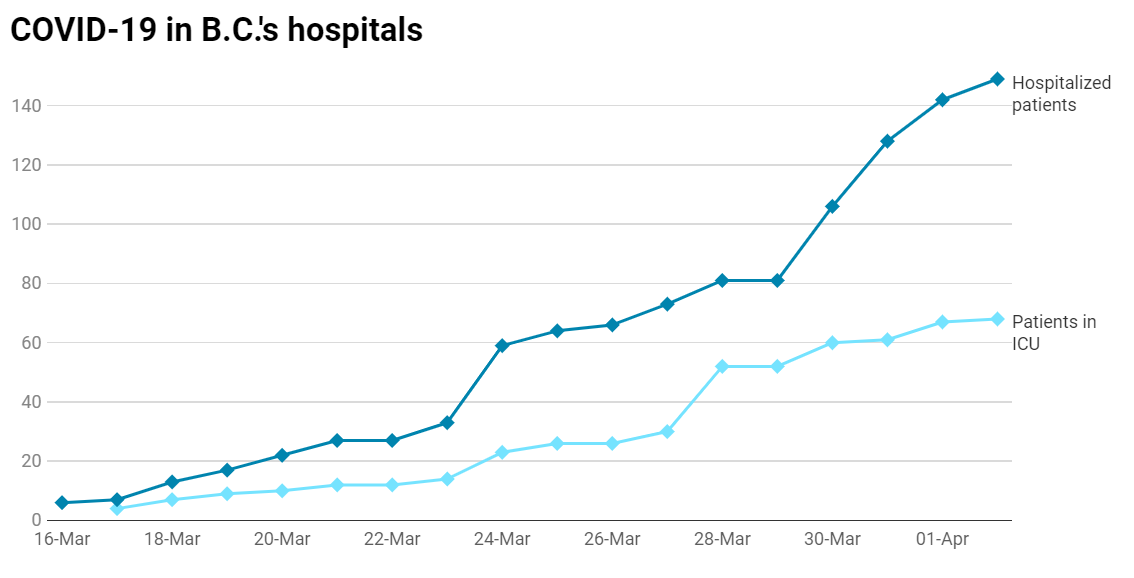The novel coronavirus pandemic has claimed six more lives in British Columbia.

Provincial health officer Dr. Bonnie Henry announced the fatalities Thursday, along with 55 new confirmed cases.
Henry said one of those new cases is at the 378-cell Okanagan Correctional Centre.
Henry said health officials had been preparing for the possibility of an outbreak of the virus at correctional facilities, and was conducting surveillance testing of inmate populations.
The Provincial Health Services Authority and Interior Health are managing the outbreak.
No non-essential travel
On Thursday, Dr. Henry also called on British Columbians to suspend all non-essential travel within the province.
Earlier in the week, the mayors of several B.C. tourist destinations pleaded with vacationers to stay away to prevent spreading the virus and to avoid taxing limited rural medical resources.
“I am asking people now to forego those kinds of travel,” said Henry.
“Particularity to smaller communities where we might not have the resources to support you should you become ill or should there be transmission in those communities.”

Two of the six deaths announced Tuesday were on Vancouver Island, the first time there have COVID-19-related fatalities in the region.

Get daily National news
One was in the Fraser Health region, and three were in the Vancouver Coastal Health region, two of them connected to long-term care homes.
B.C. now has 1121 lab-confirmed cases of COVID-19, the disease caused by the virus, and 31 deaths.
As of Thursday, 641 people had recovered from the disease while 149 were in hospital, 68 of them in intensive care.
Care home concerns
While Dr. Henry issued a public health order barring health-care staff from working in more than one facility during the outbreak, she acknowledged that the new procedure wasn’t in place yet.
Workers at the 21 facilities where there has been an outbreak are currently barred from staffing any other seniors’ homes.

But with an estimated 20,000 staff and contract workers in the province’s long-term care and independent living facilities, Henry said it would take time to roll the new policy out province-wide.
“This is something that has been a crisis in the making for a number of years,” she said.
Health Minister Adrian Dix said the province was still working with the affected unions and facilities, one third of which are fully public, and the remainder of which have publicly funded beds in private facilities.
Enforcing quarantines
With Canada now repatriating large numbers of Canadians from foreign counties and cruise ships, Dix acknowledged “we need to do better” at communicating quarantine regulations at B.C. airports.
Canadians returning from international travel are legally required to self-isolate for 14 days, under penalty of fines or even jail time.
But Dix said following the rules is ultimately up to individuals.
“Whether people were adequately contacted at the airport or not is not an excuse for people not to comply with the order,” he said.
“They have to self-isolate for 14 days when they come back from outside of the country.”
Henry said the B.C. RCMP was still sorting out its role in enforcing the federal quarantine, but pointed to new provincial moves to redeploy liquor, cannabis and gambling inspectors to help enforce the province’s own public health orders.
“Our way of approaching this in public health is to ensure that people know what is expected of them, and that’s the first thing,” she said.
“Most of the cases that we’ve been involved in … it’s people not understanding and not being very clear of what’s expected of them.”
On Thursday, Canada reached 10,000 confirmed cases of COVID-19.
- Sentencing hearing underway for Maple Ridge man guilty of interfering with human remains
- ‘These boys were all of our kids’: Hockey community mourns players killed in crash
- Extortion suspects claiming refugee status ‘ludicrous,’ B.C. premier says
- B.C. government working on a deal to keep the Whitecaps in Vancouver










Comments